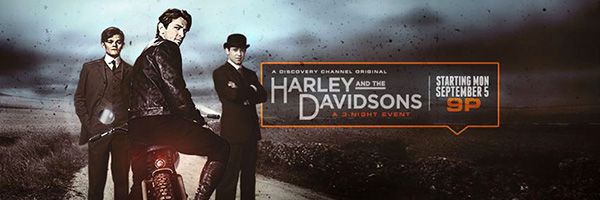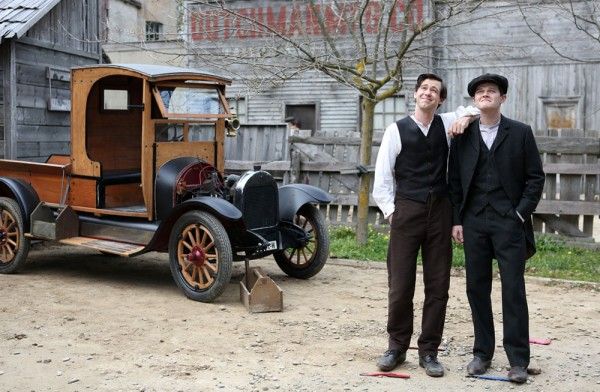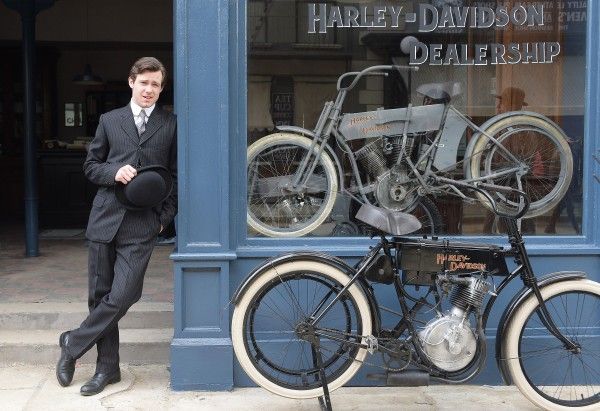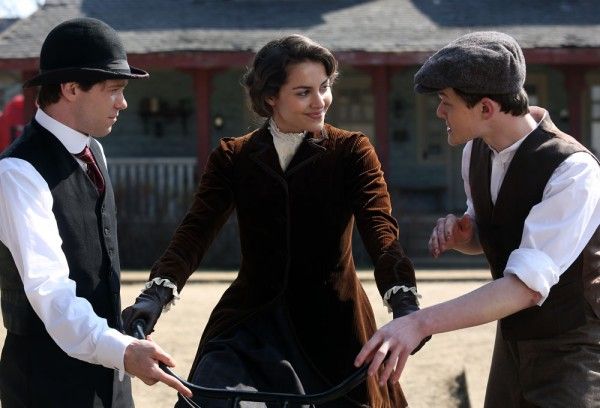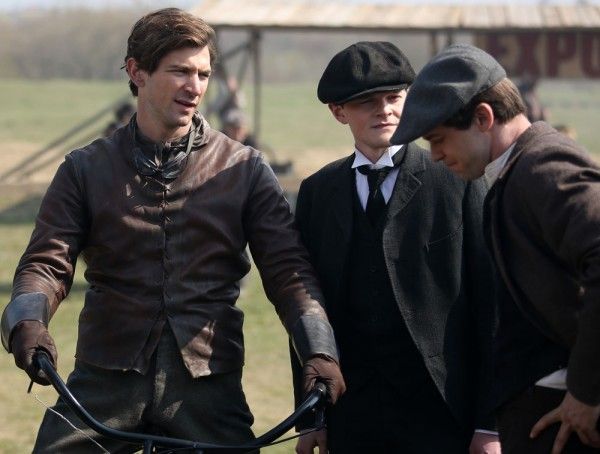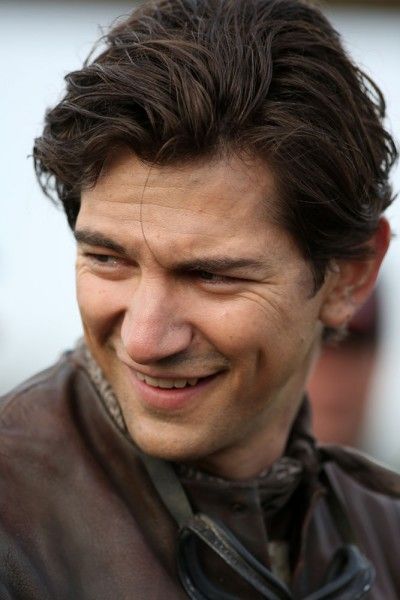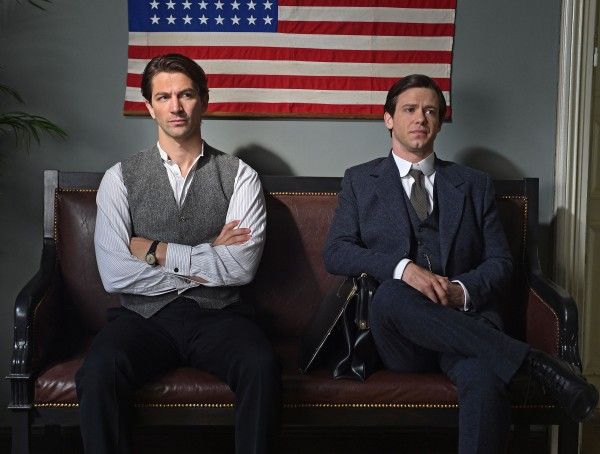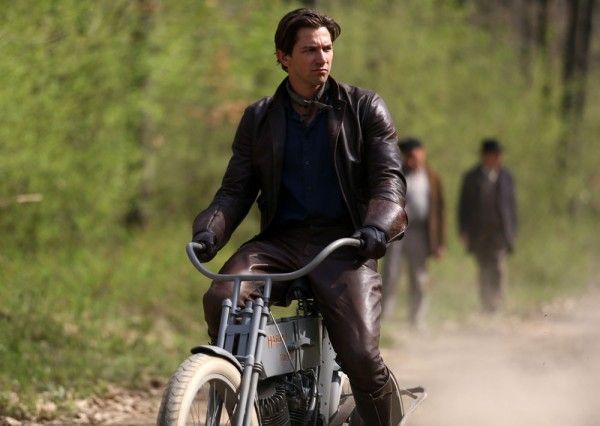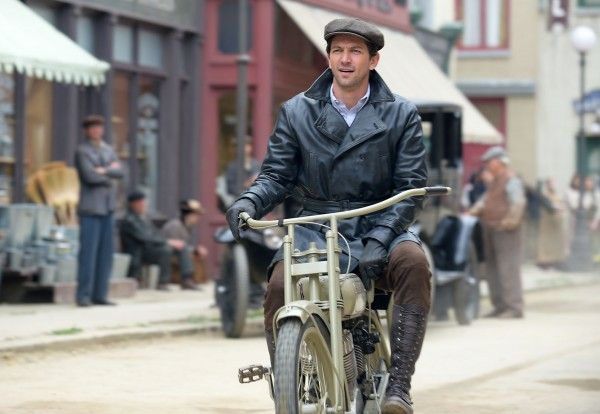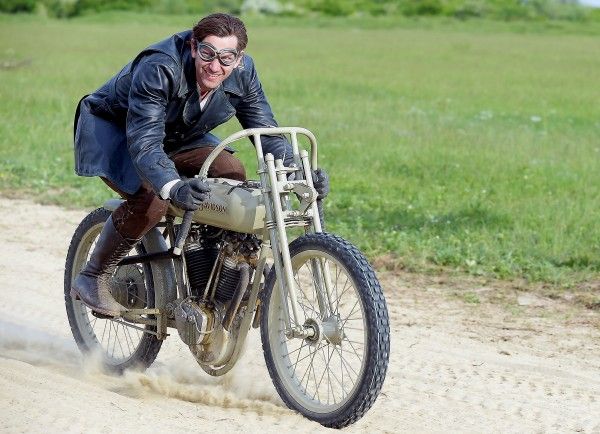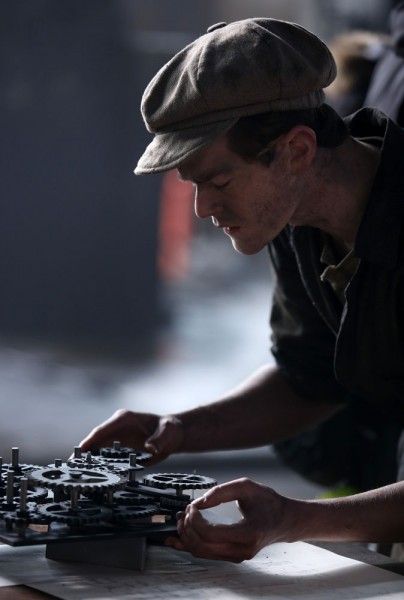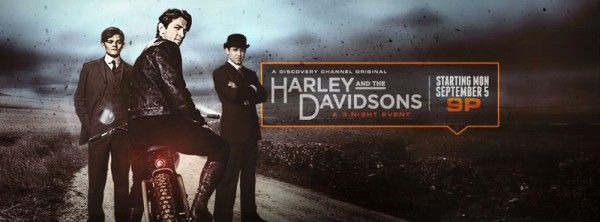Based on a true story, the three part Discovery mini-series Harley and the Davidsons tells the story of the birth of the Harley Davidson motorcycle and the company that Walter (Michiel Huisman) and Arthur Davidson (Bug Hall) and their friend Bill Harley (Robert Aramayo) built from the ground up. Endless obstacles, ruthless competitors and life-or-death risks constantly tested these sons of blue collar immigrants, while they risked their entire fortune and worked to strive for the ultimate American dream. Now, the Harley Davidson company is a legacy that has endured for over 100 years.
During this exclusive interview with Collider, co-stars Michiel Huisman (Game of Thrones, Orphan Black), Bug Hall and Robert Aramayo talked about why this project appealed to them, getting to explore a character over such a long period of time, how these two families came together to start what was ultimately a hugely successful business, how scary the early motorcycles were to ride, the incredibly authentic sets, and how they’ll never look at a Harley-Davidson motorcycle the same again.
Collider: How did this come about for each of you, and are you personally interested in motorcycles?
BUG HALL: I think the motorcycles were a big part of the appeal. Me and Michiel rode, growing up, and loved motorcycles. For me, as far as work goes, motorcycles are never really going to do it, so it was really the script being as good as it was that brought us to the table.
ROBERT ARAMAYO: For me, personally, what I liked so much about the story was that I loved Bill, on the page. He grew into somebody who’s quite a sensitive man in a very harsh world. That was just so interesting to me. As an actor, to think about playing a character like that, in this crazy, harsh world, was very appealing to me.
MICHIEL HUISMAN: Especially when you realize how what they created in those early days lasted, I felt like it was a story that needed to be told. We owe it to the legacy of Harley Davidson to tell the story of the early days.
I would imagine that you don’t often get this kind of character development over this long of a span of time. Was it cool to get to explore that?
HALL: When I first heard about it, I was excited because it was motorcycles. When I read the first script, I was excited because I thought it was great. But when I realized how expansive it was, over time, as an actor, that was the biggest appeal to me. That’s a once in a lifetime opportunity for most actors, to be able to play a character over all those years. And the mini-series is the perfect medium for that.
This story couldn’t really have been told with just a two-hour movie.
HALL: No. It would have felt very truncated. But we have six hours to play with, and they really utilized it well.
Who are these guys and how did they end up going into the motorcycle business together?
HUISMAN: First of all, what surprised me, when we started doing research and reading about the history, was that both families were immigrants. The Harleys came from the U.K. and the Davidsons were all Scottish. Who knew?
HALL: They were neighbors. They grew up in the same small town. They went fishing together. Like most small towns, you know all the people around you, and you bond and unite with the ones you share common interests with.
HUISMAN: That’s how they built their company. Family and friends got involved.
HALL: It was very family oriented.
ARAMAYO: But it’s important to know that the energies of the two households are completely antithetical. In the Harley household, you could hear the clock ticking, everyone was very quiet and dad was reading the paper. In the Davidson household, everyone was arguing and screaming at each other. What I think is really interesting is the relationship between Bill Harley and Arthur Davidson. Me and Bug spoke a lot about how many crackpot ideas Arthur had had, that he tried to make. He was always getting Bill into trouble. Bill was always, “Okay, I’ll do that,” and then it would all fall on Bill.
HALL: Bill probably owes his engineering genius to the fact that Arthur was always making him build stupid stuff.
ARAMAYO: You would say that, wouldn’t you?!
HALL: Obviously, that’s how it happened!
These guys seemed to not really have any idea about just what they were getting themselves into while they tried to sell everyone else on the fact that they knew what they were doing, all while hoping they didn’t die while they were testing out their motorcycles.
HUISMAN: Of course, our story is based on historical fact. At the same time, even though there’s a lot written about the history of Harley Davidson, there’s not that much that we know about who these guys really were and what they said to each other at a business meeting, or whatever. It was up to the writers and us to create that world.
HALL: We were really taking caricatures. The little snippets that we had gave us this very caricatured impressed. We had to ground them in real life and make them real people.
Watching this story, you see the similarities with what it must have been like to try out the first airplanes and hope that they didn’t crash.
HALL: We got to experience a little bit of that because they built all the bikes. They were putting them to really high stress and you’re going, “This isn’t something you bought off the manufacturing floor.” The pipe frame has been bent by hand and you really have to trust that they did the job well, or things can go bad really quickly. Although it had been done before, they were still making something where they had to come up with ideas on the fly and trust their own handiwork. It really says something about the character.
HUISMAN: One of the few quotes that I could find from Walter Davidson was about riding and racing the bikes. In our story, it’s mostly Walter riding. But actually, in reality, all three of them were racing their early motorcycles. And he said something along the lines of, “When I’m riding in a race, it’s not so much fear that I experience, but the dread of the machine potentially fading.” I could so relate to that. We had those challenges. And at the same time, it speaks to what kind of a man he was because it was so dangerous. Apparently, he was not so much afraid for his life, but he was thinking about the bike holding together.
With each night of this mini-series covering about 30 years, what can we expect from what’s to come for these guys?
HALL: What’s really cool is that it’s all in the context of history. You talk about a slice of Americana, and this is a lot of slices of Americana. You’re really seeing not just these guys and their company evolve, but you’re watching the world evolve and change around them. You get to watch them adapt along with it, through the Great Depression, through the war and through all of these events, while retaining their values, and continuing to create new things and stay at the cutting edge of technology. It’s just so cool. With a smaller story, you’d get a smaller slice of that. Seeing this world just explode around them while they keep their feet planted was just a different story to tell.
HUISMAN: If you look at the three episodes, over three nights, the first night is about the creation, the second night is about how to turn that into a company that’s viable and its ongoing rivalry with other manufacturers, and the third night is really about their legacy. And this all spans a 30-year period.
Once you do all of the research, you read about these people, and then you play them, does it make you look at motorcycles differently?
HUISMAN: Absolutely! I respect motorcycles so much. They’ve come such a long way. It’s amazing!
HALL: It’s the kind of thing where you’ll never look at that object the same way again. I will always bring these associations when I hear any motorcycle, but especially when I hear or see any Harley Davidsons.
ARAMAYO: There were a lot of mirrors of the company’s development that you could relate to, but one of the best things was the bikes themselves. As we shot a new time period, new bikes would come in and you’d watch that develop. We started in a shed with a bike frame.
HALL: And we literally did. We practiced how to build that first bike. And then, all of a sudden, we see this monster of a motorcycle.
ARAMAYO: It’s just a great reflection of what these men achieved.
HUISMAN: I was shooting a scene in the first episode and I was supposed to ride off. The director was like, “Okay, you jump on it and ride off.” And I was like, “So, you mean I jump on and start pedaling, and then I slowly increase the tension on my belt?” He was like, “No, you don’t start pedaling.” It was a bicycle with an engine, so I had to pedal. He was like, “It’s too confusing. People are going to think it’s a bike.”
HALL: When you film something, you’re not seeing it cut together in your head, so you’re just trying to make it live and breathe, and you’re trying to be as authentic as possible. We shot as chronologically as possible, so we really did see these bikes get wheeled in, day after day, with these little evolutions. Every time, we were like, “Woah!,” and we’d stop filming to check out whatever the new bike was.
HUISMAN: It felt like we made it.
HALL: You look back, in hindsight, and you go, “How did we get this far?” I had that sense when I was watching it during ADR.
Was it fun to be on such authentic looking sets?
ARAMAYO: It was amazing! Showing up to those races and seeing those sets absolutely blew my mind. I was so honored to be working on that. It was fully realized. I felt like I was at a race in the middle of a field.
HALL: If you think about some of those races, especially in the motordromes that they started calling murderdromes because they were so dangerous, the way that it was recreated was amazing. On this show, you can see and experience, a little bit, what those races must have been like for those guys because they don’t exist anymore. They were terrifying.
HUISMAN: Our stunt guys would take a lot of risks, but they loved it. That’s what they live for. It could have gone really wrong, and it went a little bit wrong.
Harley and the Davidsons airs on Discovery on September 5th, 6th and 7th.

